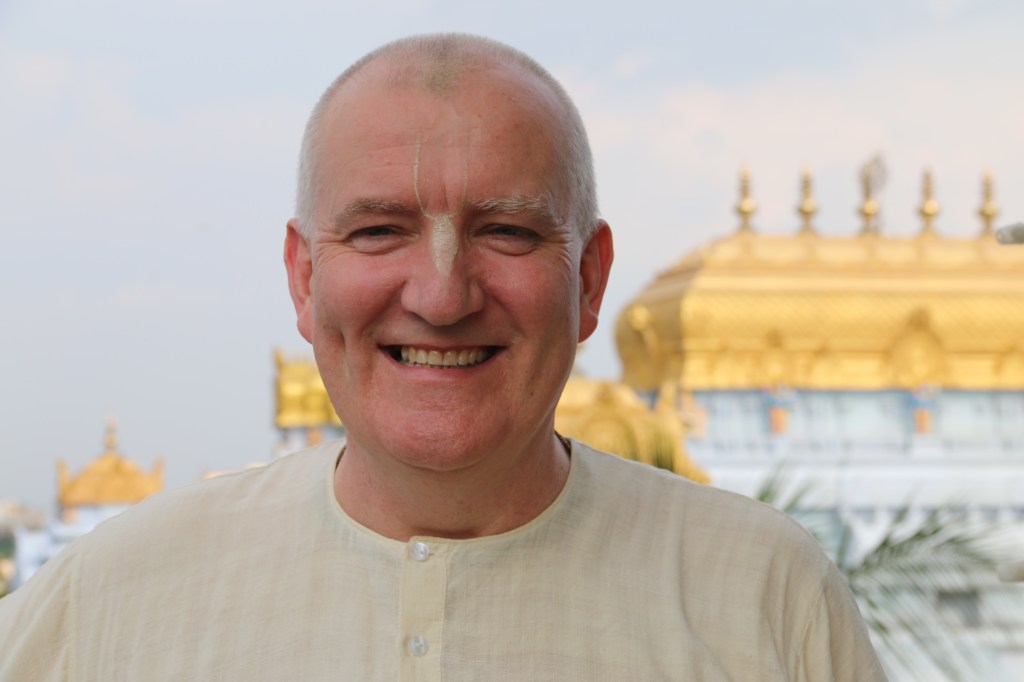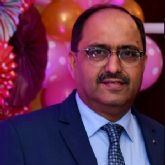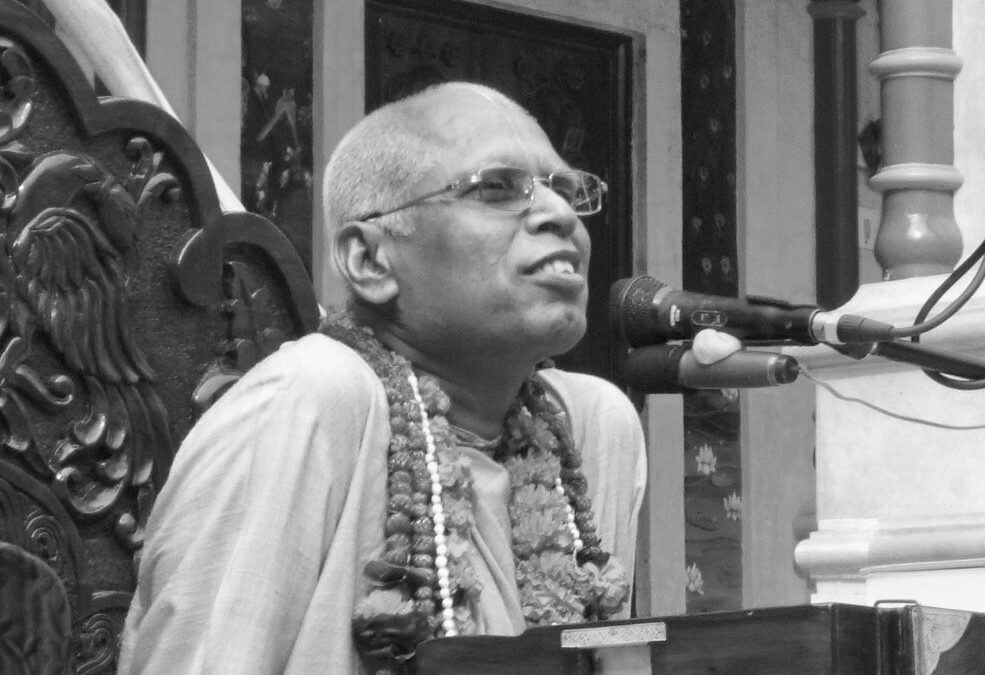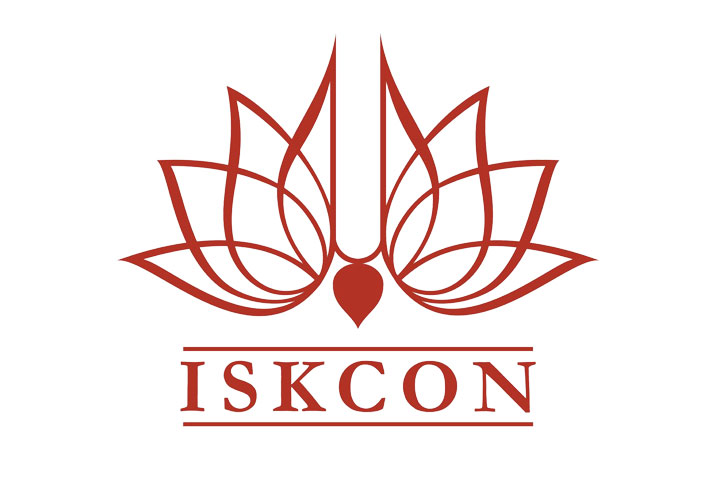Vedic Inquirer Interview with Praghosa (GBC)

Praghosa Prabhu (GBC Member) was interviewed by Damodara Prabhu of Vedic Inquirer on July 17, 2021.
Topic of child protection starts at 20:16. Video cued to that mark.
Key Excerpts
Damodara: A lot of people would see you’ve got all the powers, you’ve got all the reins, so whatever is happening with the society is down to you (the GBC). You’ve got the ability to drive it, you’ve got the ability to make things happen. I was just wondering if that is the practical experience or not?
Praghosa: The conundrum from my perspective is [Prabhupada] used this phrase, or not just used it, it’s the first item in his Will, that the GBC is the Ultimate Managing Authority of ISKCON, of the Hare Krishna movement. But then, and there’s so many references, where Srila Prabhupada talks about a GBC can’t impose his opinion, or his views, or his authority for instance on the Temple President, as an example.
In one sense we’ve seen, and everybody does see I think that knows ISKCON reasonably well, does see the GBC as being in charge… but actually they have very little power. It’s really a facilitating role. Trying to work with devotees, “Yes, these are the standards we are meant to follow. This is the vision that Srila Prabhupada had, let’s all work together towards it.” But once you have somebody who chooses not to do that for whatever the reason may be, it’s not that the GBC can just issue a dictum and everything changes, it’s really not like that.
Being the ultimate of course, ultimate as well, can be misunderstood, not misunderstood, but people have different understandings of what that word means. But I think in the context of the reality of the GBC role, it doesn’t mean absolute, it means “has the last say” if you like. But it certainly doesn’t mean absolute, and absolute power, and authority, that really doesn’t exist.
ISKCON is incorporated in many jurisdictions across the globe, and it’s the incorporation of ISKCON and the devotees, or the offices that have that legal authority to run that organisation; they’re the ones that actually have, quote-unquote, the power.
It’s not a GBC who just internally has the role of being the ultimate managing authority. They have that authority based on Srila Prabhupada’s instructions. But based on other aspects; legal, other kind of, um, yeah, other aspects, they don’t have that, they don’t have that.
It is a constant challenge actually. Obviously from some perspective you think, and certainly in certain circumstances you would think it would be great if you did have that, because it would make things more simple, you could make quick decisions etc, etc. But Srila Prabhupada didn’t give that kind of authority, and it really very much is a facilitation and a negotiation etc, and trying to work with people all the time.
Damodara: So let’s turn to raising children in Krishna Consciousness. Clearly really a big strategic factor for our organisation. To what extent do you feel that there is a vision for what it means to grow up in Krishna Consciousness, to grow up in ISKCON?
PD: Without getting into the history of that (Damodara had cited Gurukula established in the 70’s) you can definitely argue, let’s put it this way, that’s been less than a successful model, and not least because there was too much imposition. Both imposition on children, and imposition in many respects on parents.
They were the days actually, it’s interesting, they were the days when in one sense the GBC was no different to what we were just talking about earlier, about the powers that we have, but somehow or other, because it was even during Prabhupada’s time, and so close to Prabhupada’s time, that people did almost spontaneously agree to what their authorities were requesting them to do, even if they didn’t particularly like it. But anyway that all, as we say, came out in the wash later on and it was, it was too much of an imposition on some. It may have suited some, but for some it was too much of an imposition, on the children, on the parents, like that.
And we are all well aware of this, ISKCON and ISKCON leadership have been quite scarred by that history. Because that has been a very, very painful history that we’re all aware of, without necessarily getting into the details.
We all join the Hare Krishna Movement because we saw the futility of life and absorbing ourselves in sensory things. That’s why we joined the Hare Krishna Movement, this was the eternal answer to our problems, if you like, and the challenges we face in the material world. So obviously we want that same opportunity for the children.
You mentioned the GBC being predominantly in the renounced order of life, and that’s true. Although there are more and more grhastas now, GBC members. I think off the top of my head I would say it’s roughly 2/3rd, 1/3rd, something like that.
But this is a challenge. Knowledge is one thing, realised knowledge is another thing. If you’ve known nothing but brahmacari life and the sannyasa life, I think for some that would be a real challenge to be able to have sufficient understanding, and sufficient empathy with both the grhasta ashram, and with children. I think that would be a challenge.
Damodara: You mentioned that the first couple of waves of Gurukula children had a less than optimal experience, to put it mildly, and there might be many of them that are dealing with life outcomes as a result of that. Does the leadership feel that it still owes something to that group of devotees? Is there a sense that this is a group that we are still indebted to somehow and in some ways?
Praghosa: Yes I certainly do! And I think it would be fair to say that the leadership would feel similar. They’re not always so sure in terms of how to really, properly and adequately address that. But I think that would be the mood.
When I first started to learn of the stuff that was going on, I was actually in Belfast. In those days of course there was no mobile phones, no Internet, none of that. So I remember receiving a letter as the Temple President, a circular that someone had sent out, outlining… it was the first time I had ever, I think that was around 1984, it was the first time that I had ever become aware that there was any kind of.…and I think my initial reaction was, somebody is just making this up!
It was outlining some of the problems, I think in the Mayapur Gurukula in particular it was talking about, and it was shocking, it was just extraordinary, you know because you join the Hare Krishna Movement and you have this youthful enthusiasm, you know like, “Wow! Here is the solution not just to my problems, but to the world’s problems!”
And you focus on Prabhupada, this extraordinarily saintly person. He just becomes an instant hero. And you’re just riding on this wave of extraordinary revelation, extraordinary enthusiasm, bliss you know. The temple room ceiling might be sort of 9 foot high, but once the kirtan got going you could literally feel your head touch the ceiling you were jumping so high because of all this enthusiasm and positivity.
Then you read this letter; “How can this have anything to do with the Movement Srila Prabhupada created… the Movement I joined? This is insane.”
Praghosa: I think one of the first times I ever went to Mayapur, maybe the second time, I made it my business to go and seek out people who had gone through the Gurukula in Mayapur to find out what their thoughts were. And one of the things that was really interesting to me is it was basically a 50/50 split. 50% of them had a wonderful experience, and of course 50% had an absolutely hellish experience.
The interesting thing was, and of course now we know this I think from other studies not by devotees, but it was amazing how the ones who had the positive experience actually had virtually no knowledge that the others were going through a hellish experience. I found that incredible, because that to my mind, that kind of told me that the people who were involved in this in terms of the abuse, they were really calculated. They were knowing how to separate these camps, and how to contain the whole thing.
I just remember being really crestfallen, you know, really sort of a weight came down on me thinking, this has destroyed my last three, four, five years, from the time that I joined. This effectively changing my whole perspective.
We have the book you know, Chant and be Happy. It’s kind of like, “yeah, chant and be happy and put blindfolds on and earplugs in for the rest of your life and then you can just chant and be happy.” But all this stuff coming at you as well, it was like, wow, very difficult.
Damodara: And of course we’re talking about this as if it all was in the past. There’s a few ways that the Vedic Inquirer, that we are looking at elements of child protection. There is preventative measures; background checks and other ways to absolutely keep kids safe. Then there is, in the event of reports, our general compliance with legal process, our referring things to CPO. Non-interference with CPO. And then also things like victim support. What’s your sense if you were, you know, looking at ISKCON’s Report Card right now? Would we get an A, B, a C, what would we get?
Praghosa: The reality is, you know, we can’t be complacent and Kali Yuga is ever progressing. So therefore, with something like child abuse, if we think just because we put a CPO in place, and just because we’ve put other measures in place that somehow or other that’s going to eradicate child abuse in ISKCON, absolutely not the case. Therefore we have to be ever vigilant in trying to anticipate it, and obviously deal with it wherever it arises. And deal with it properly in terms of what we’ve just mentioned there in terms of the autonomy of the CPO.
So the creation of the CPO in the first place obviously was a very big and good step. It had two main mandates. The first mandate was obviously to protect children, as in the name, and deal with cases of child abuse to ensure that the people responsible for those activities would be in receipt of appropriate consequences as a result of what they’ve done. And then also to keep them away from ever being able to access children again within our organisation.
Then the other main part of the mandate for CPO was to educate us all on the importance of the protection of children. Part of that then also was to help the children who have suffered abuse within our movement. I think that part in particular has been poor. That part has been poor.
In terms of looking after those who have suffered at the hands of devotees serving as ISKCON devotees, that has not been very good.
Damodara: Let’s just explore the idea of societal values and so on. We might have our own internal reference, you know, api cet su-durācāro. There might be the tendency to go, “Well, Prabhupada was always kind if someone fell down.” Then there are other societal attitudes that would say, “This is beyond a fall-down, this isn’t consensual sex, or smoking a cigarette or something. This is the violation of a child. There are no grounds in which someone can be reinstated in a position of privilege.“
I don’t know if you have a view on that as to what extent are we taking a lenient position based on sastra and what sastra says about sadhus redeeming themselves, and to what extent should we take into account community sentiment, both the devotee community in respect of locales, as well as the general population?
Praghosa: I do have a view. And I have a quite strong view. And a view that is either sometimes not appreciated, or a view that is seen as somehow or other too simplistic, which I completely refute. And I’ll go back to that…
First I just wanted to go back to the point you made about Srila Prabhupada, and you quoted the api cet su-durācāro verse. Doesn’t apply in my humble opinion, doesn’t apply. And the reason it doesn’t apply is Srila Prabhupada could practically do anything, practically have done anything when he was physically present with us, and we would have expected it. Because of his stature, because of his purity, because of his, you know, complete freedom from any motivation for whatever decision he would or wouldn’t have taken. We don’t have that adhikara. We will never have that adhikara. Therefore we cannot just simply say, “I think Prabhupada would have done this in this particular situation.” Particularly if it’s a controversial thing like we’re talking about, the subject we’re talking about, we can’t do that, we simply cannot do that. And anyone who argues that, in my humble opinion, anyone who makes that argument is not qualified to be in any leadership role in Srila Prabhupada’s Movement.
Then it becomes really simple to me, really, really simple. You mentioned that child abuse is not the same as an ordinary falldown related to it being non-consensual. And it’s impossible to be consensual simply because a child legally cannot give its consent. So therefore it can never be consensual.
We used to have this phrase when I was a kid in school, and the teacher would say, “you’ve blotted your copybook.”You’d get a mark on your copy book (made by an ink pen). So my view is very, very simple; if you have blotted your copy book in this lifetime – because sometimes you hear the Jagai-Madhai argument being used, “Oh they were such big rascals “big demons, but Lord Caitanya and Lord Nityananda had all this mercy for them… Haridas Thakur gave them all this mercy.“ Yes, but from the time they surrendered, from the time Jagai and Madhai surrendered, I’m not aware that they ever engaged in this activity ever again.
So this is different. When we first joined the Hare Krishna Movement, and we aspire to take initiation, we have to be following the four rules and be chanting 16 rounds a day prior to initiation. Then at initiation you make a formal commitment to follow those vows for the rest of your life. Then in the case of sannyasa, what to speak of gurus etc, we take further vows. So we’re taking all these vows. If we then violate those vows in such a gross way as to abuse a child, take advantage of a child – and why are they taking advantage of children? For personal gratification. It’s just so simple, you’re taking advantage of a child for personal satisfaction!
Once you do that, you can never serve again in any position of authority in the Hare Krishna Movement, whether that be a Temple President, whether that be a GBC, whether that be a Guru, whether that be a Sannyasa, you cannot serve in any of those roles again.
You can do millions of things in Krishna service. You don’t have to be a GBC or a Guru or a Sannyasa to do that. So therefore, in the mood of protecting, in the mood of properly respecting the people who have suffered this abuse and that they see that it is taken seriously, in the mood of protecting Srila Prabhupada’s Movement in the eyes of the general public, and in the mood of honouring Srila Prabhupada’s concern about charlatan meditators that he talks about in some different purports, and that he talks about the black spot on the white sheet, and that he talks about Caesar’s wife should be above suspicion; For all of those reasons, respecting those who have been abused, protecting the Movement, honouring Srila Prabhupada’s references, the GBC should not even have to act to say these people cannot serve in those roles going forward!
They should do it! They should have the integrity, decency and honour to say, “I have blotted my copy book in a very serious way after taking my vows. So after taking those vows I have now fallen, not just transgressed them, but in the most egregious, gross and hedonistic way, therefore I am stepping back from all of those roles.“
And if they don’t do that, then the GBC has to act to ensure that is what happens! That is my view, and I’ve expressed that to the GBC body many times, and I can never see me changing that view.
Damodara: And would you be confident that your fellow GBCs will draw the line in the same place, or is that yet to be discussed and agreed?
Praghosa: Well some certainly would, that’s for sure, some certainly would. We all can be forgiven. We know that every single living entity in the cosmic manifestation is open to go back to the spiritual world. So no matter how horrifying the activities we might engage in while in the material realm, ultimately we will go back to the spiritual world. So that’s not in dispute, so that api cet su-durācāro verse is fine, everyone will be forgiven. But my point is, “Plus, they don’t have to serve as a Guru, Sannyasa or a GBC, at least not in the rest of this lifetime. Maybe next lifetime, whatever they can, but not this lifetime.” Set the example!
So your question, do the GBC… so some certainly do. But yeah, some for whatever… and hopefully they’ll listen to this conversation, but if I was with them now I would say, “Some may not for some strange, odd, peculiar, weird, and unjustifiable reason.”
Damodara: I was thinking back earlier to you talking about how the CPO now exists and so on. One of the concerns I think that is generally shared on the Vedic Inquirer is that when in the late 90s the CPO was first set up, I think in response to the Turley case or whatever, it had a budget of something like $160,000 a year. That’s now $10,000 a year.
That seems like an awfully minimal amount for a reasonable Office. I think Hare Krishnas in Britain podcast referenced that they did a search and that £2 million a year is spent on devotee wages in the UK.
To what extent would the whole Child Protection agenda be a shared concern? Quite often there is a firefighting kind of nature to the GBC, and there might be particular fires at particular times. But on an ongoing basis, would this be in priority A, B or C? Big concern, minor concern, or just one of many things?
Praghosa: Every single GBC gathering whenever we come together we always get a full report from the CPO Director as to how all things Child Protection are going in ISKCON, and what we can do, what more we need to do, and practical steps that we can take, etc.
It’s kind of like one of these things where, you know, even those things happen, it’s just not enough because so much more needs to be done. But I would say from a kind of, an intention, let’s use that word maybe, from the intention perspective, you know, it is definitely high up on the list of things, of priorities the GBC are concerned about, and want to do something about. But yeah, that doesn’t mean that it translates into sufficient practical steps that end up getting taken.
Damodara: We did a little bit of research about GBC Resolutions (reads some of the resolutions). The very thing that you stated earlier, that no one who is guilty of these things can ever serve in one of these offices again. I guess sometimes when the GBC passes a resolution it’s hard to implement… the worry that sometimes the GBC doesn’t even implement its own standards, or it goes flaky or whatever on those things. I don’t know if you’ve got a comment on that?
Praghosa: On the first one that you referenced about reporting to statutory authorities. All I can say is as it relates to my own area of responsibility, that is our policy, that is our policy. If anybody makes an accusation of child abuse against someone serving in ISKCON, it’s immediately reported to the outside authorities. It’s a simultaneous process actually; it’s reported to the outside authorities, and it’s reported to the CPO. And then as the Management of the Yatra we have no more involvement in that, you know, it’s all done by the outside authorities and the CPO. But again, whether that’s consistent across the world?
No one can serve in a leadership position again, as far as the CPO at least are concerned, if someone is found responsible for any kind of child abuse. That usually is the case. I could be corrected, but as far as I am aware the CPO do actually stipulate that they cannot serve in those leadership positions.
Damodara: As you know, there’s quite a lot of conversation going on, and quite a lot of concern about the Society’s performance in this area at the moment. If you had a closing message as a member of the GBC to all those who are, you know, concerned about ISKCON’s general performance when it comes to Child Protection, what would be your general message to all those devotees?
Praghosa: It’s such an important issue, it’s such a noble issue, the protection of our children. Prabhupada talks about children, the protection of children gives the human form of life it’s best chance to prepare a way of liberty from material bondage. So it’s so ironic, you know, they are our future leaders, and if they’re trained properly in Krishna Consciousness, wow! What a positive future the planet has if we have all these wonderfully empowered devotees who have been devotees from birth.
And by of course the issue of child abuse, so many of them have been so scarred, and you know that’s arguably the biggest tragedy really you know; we are literally doing it – 1: the people who are guilty of it, but 2: the leadership if it doesn’t properly deal with it – we are literally shooting ourselves in the foot, both feet!
Sometimes I know some devotees take exception to the fact that some devotees express this in an angry way. Personally I have no qualms about that whatsoever because, you know, I have a five-year-old granddaughter and a two-year-old granddaughter now… I actually spent time with them yesterday. If anyone interfered with these two kids, you know, I wouldn’t be responsible for my reaction. So for anybody to say, “Oh, it’s too angry or too emotional” to them I say “You go out, have a child or a grandchild and see how you would feel if some stranger, or even worse, some person that you respected was to then interfere with them and take advantage of them in the grossest kind of way. See what your reaction would be!”
So all I would say is let us all… and it’s not that the leadership, certainly not all the leadership is somehow or other not concerned about the subject, or doesn’t take this subject seriously. They very much do. So for me it’s kind of like, let’s unite together and work together on this. We need to be united, and we need to cooperate together to eradicate this.
And there are huge amounts of devotees in the leadership of ISKCON, not just the GBC, but at Temple level, at Regional level, etc, who are very concerned about this. So I would just say let’s all unite together to really do everything we possibly can to significantly reduce, if not completely eradicate this curse from our Society.
Damodara: Now we do have a few questions if you have an appetite to keep going?
[Jiva Goswami’s comment on the live feed: I think the problem with the idea of “absolute” authority is that many GBCs are also prominent gurus with many disciples and lots of wealth at their disposal.]
Damodara: Just another angle on this; it could be that if someone has many disciples then there’s an extra complexity in terms of dealing with that person, in terms of ISKCON’s responsibility to the followers, the shaking of faith and so on. So is there a risk of a two-tier system here which even includes the application of justice and so on?
Praghosa: The one word answer to that question is, yes! There is definitely that risk. I remember the financial crash and this new phrase came out, “Too big to fail” and it was particularly referring to banks, you know, the banks are too big to fail, and therefore the Government had to prop them up with taxpayers money.
So it’s kind of similar, you know, that if you have somebody in a very prominent position – and we talked about GBC, Guru, Sannyasi, like that – if you have someone in a very prominent position who is either accused of this, or even indeed guilty of this type of thing then yeah, to use your phrase, you have a two-tier system.
It will be and is, more difficult to deal with that type of situation. But again I go back to what I said earlier; I don’t care! I don’t care. You do the right thing. And particularly if you’re in a position of leadership for running the Movement, you do the right thing.
You don’t consider what the potential consequences may be. Because otherwise what’s the alternative? The alternative is you start thinking of possible consequences and then you try to mould your decisions around mitigating against those consequences, and before you know it you’re in all sorts of compromises and watering down all sorts of things.
What sort of solution is that? Better you stick.… you know, simply do the right thing, then you know you’re going to have Krishna and Prabhupada on your side. You do the right thing, and wherever the cards fall, whatever the consequences may be, deal with them as they fall.
So that’s my view, and I’ve explained this all to the GBC in various circumstances and situations that we’ve had to deal with over the years; “Don’t let ourselves be influenced by that, don’t! Just do the right thing and then we’ll deal with whatever comes as a consequence of that.” And then you know that you’re dealing with it from a position of at least moral authority, and the authority of integrity.
Then the other thing of course is when you go down that route of trying to orchestrate, trying to manipulate, trying to, yeah, engineer what you see to be the best outcome, people see that! People see that that’s what you’re doing, and therefore they’ll take advantage of that… anything they want they will know, “Well these guys they don’t operate on the basis of principle, they don’t operate on the basis of doing the right thing, they’re open to negotiation.” And it just becomes all murky and wrong.
There is no doubt that it does make things more difficult, that’s just the way it is across the planet, that powerful people do have the ability to try to, you know, whatever… but I’m just saying we should identify that, we should be aware of that, then we should do the right thing, and then just deal with the consequences as they fall.
Damodara: Well a massive thank you Pragosha prabhu for coming and answering our questions, and for putting a human face to the GBC. I’m sure they’ll be many more questions. So maybe we can have either you or one of your peers on in the future as well?
I do appreciate your speaking so forthrightly. We pray that Prabhupada gives you all intelligence and strength to do a sterling job of leading his organisation.
Praghosa: [offering pranamas] You’re very kind Damodara Prabhu. I wish you all well in your service. For all those that are tuning in, I thank them for tuning in and, I just give a commitment that we will continue on with the good fight.
END: 1:11:45
![]()






